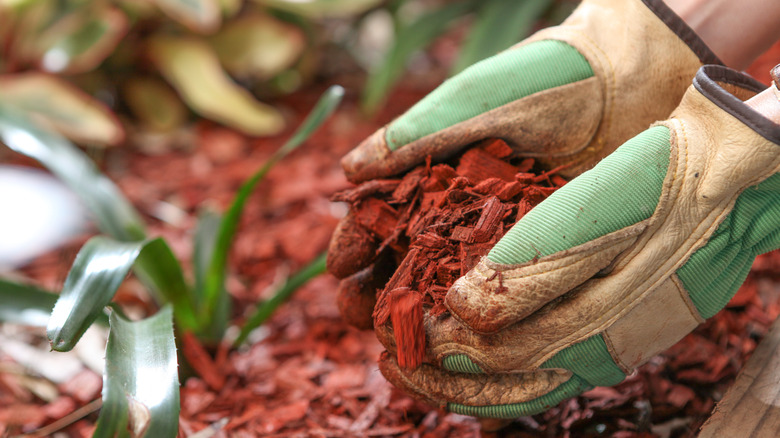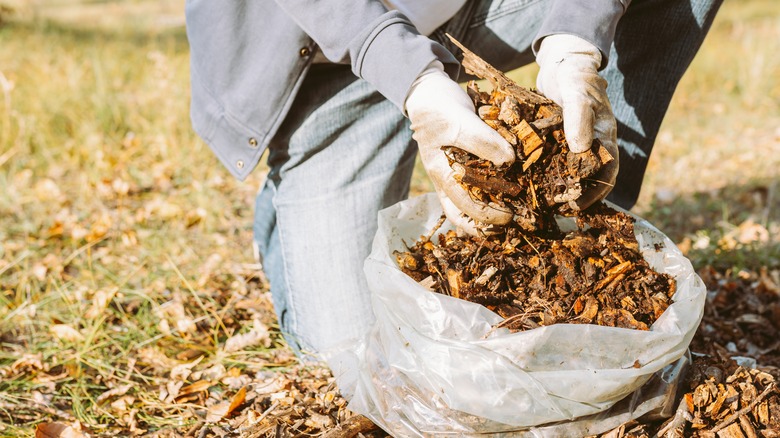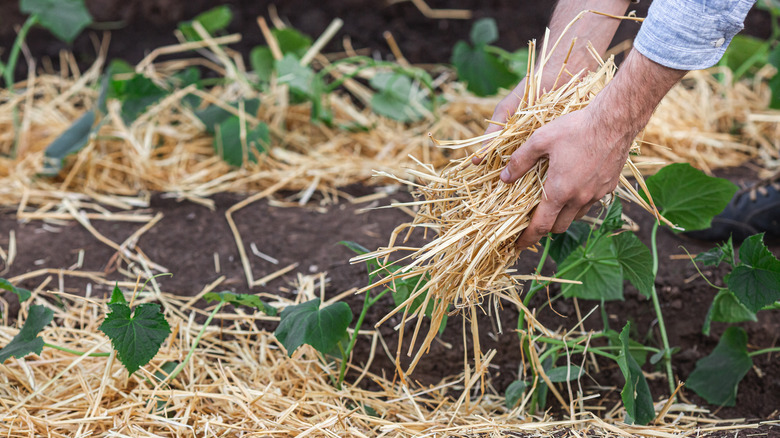Is The Dyed Mulch In Your Vegetable Garden Toxic?
Dyed mulch, with its rich red or black hue, can take your whole yard up a level when added to your garden. Besides looking nice, mulch has many benefits from controlling weeds to helping soil stay warm and better retain moisture for plant growth. However, the one concern about dyed mulch is whether or not it is toxic for your vegetable garden. This is a common fear that you will find all over the internet on gardening websites and forums because dyes used in mulches are likely to seep into the soil and then into your plants. While this isn't necessarily a huge problem for ornamental flowers, it could be a problem if you plan on eating what your garden produces.
Luckily, most dyed mulch on the market is not toxic and uses natural dyes. In fact, according to the University of Massachusetts, dyed black mulch is often colored with carbon and dyed red mulch is typically colored with iron oxide, both of which are natural substances that are safe for vegetable gardens. However, if the price of a mulch looks too good to be true, it might be worth it to check the back of the package to see if a chemical dye was used. If so, it's best to avoid that specific mulch brand and go for one that uses a natural dye.
Mulches that can be toxic
While the color of your mulch is unlikely to make it dangerous for your garden, some dyed mulches can contain toxic chemicals for other reasons — and the biggest culprit is recycled wood. While recycled wood may sound like a good idea because we tend to believe that anything "green" is also healthy, the problem with recycled wood is that it is impossible to figure out where it came from. This means that it may have come from a construction site and been exposed to or treated with unknown chemicals. It may even be from an old wood pallet some of which have been treated with chromated copper arsenate which is toxic and was proven in a 2003 study to leach arsenic into soil. Because of this, if you want to use recycled wood mulch, you will have to be very careful and research each brand and the source of their wood before purchasing.
Another type of mulch you may want to avoid using in your vegetable garden is the free public mulch that is created by your local city or municipality. According to Pennsylvania State University, the reason for this is that these mulches are made from a mixture of many types of plants, trees, and grasses from around the city and may contain various unknown pesticides and herbicides.
Organic mulches to use instead
If you want to avoid the headache of trying to figure out which store-bought or free public mulch is safe to use near your veggies, you can turn to organic mulches instead. When a Redditor on the gardening forum of the website asked which natural mulch was best for vegetable gardens, the most common answer was straw. Straw is a great option because it is cheap and easy to find. Plus, it easily breaks down, meaning that it quickly adds nutrients to the soil and is gone by the spring so that your plot is ready for the next year's planting. However, as one commenter on the same Reddit thread pointed out, with straw, you need to make sure to buy the kind without seeds — or you will end up with a hayfield instead of a garden the following year.
Also, the options don't just end there. Various types of organic mulches, from pine needles and nut hulls to compost and sawdust, are great for vegetable gardens. However, even with organic options, you will still need to be careful about how the materials are sourced. It's a good idea to purchase organic mulches from companies selling mulch specifically for vegetable gardens or to make it yourself with materials that you know haven't been exposed to pesticides or herbicides.


